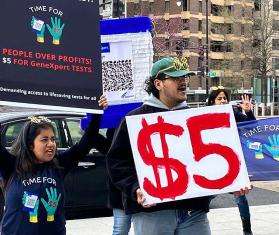
|
Click Here to Learn More and Help Us Fix the TPP!
New York, June 12, 2015 — As the United States government attempts today to secure Congressional authorization for final negotiations of the Trans-Pacific Partnership Trade Agreement (TPP), damaging provisions remain in the deal that will lock-in high drug prices and keep affordable generic medicines out of reach of millions of people, the international medical humanitarian organization Doctors Without Borders/Médecins Sans Frontières (MSF) said today.
If approved in its current form, the TPP, which is being negotiated between the U.S. and 11 other Pacific Rim countries, will have a devastating impact on global health. It would lower the standard for which medicines deserve a patent and extend patent monopolies for modifications to existing drugs. It would also delay the availability of affordable versions of biologics, a new class of important medical products that include everything from the latest cancer medicines to vaccines.
“The U.S. Trade Representative has so far given no indication that it intends to remove damaging intellectually property provisions from the TPP text,” said Judit Rius Sanjuan, U.S. Access Campaign manager and legal policy advisor at MSF. “On the contrary, in its quest to finalize the trade deal and also ensure support from members of Congress, the USTR is downplaying the legitimate and serious public health implications of the TPP. That’s why we’re imploring the public to help us fix the TPP by calling their Congressional representatives.”
MSF relies on affordable generic medicines for its programs around the world. The organization has repeatedly expressed its concerns to the USTR, Members of Congress and directly to President Obama.
Some of the most concerning provisions in the TPP center on so-called ‘patent evergreening,’ which would force TPP governments to grant pharmaceutical companies additional patents for changes to existing medicines, even when those changes provide no therapeutic benefit to patients.
“Patent evergreening is a very nice-sounding term for a damaging practice that allows pharmaceutical companies to be rewarded for doing very little actual medical innovation,” said Rius Sanjuan. “Evergreening can extend patents indefinitely, block generic competition, and keep prices high for extended periods of time. The TPP is on track to standardizing this abuse of the patent system across at least 12 countries.”
The TPP also involves so-called “data exclusivity” for biologics, a new class of medicines including vaccines and cancer and multiple sclerosis drugs. Data exclusivity blocks competing suppliers from using existing clinical trial data to gain approval for generic versions of these drugs and vaccines. The TPP will block generic producers of biologics from entering the market for at least 12 years, during which patients and treatment providers such as MSF would be forced to endure astronomical prices.
“Despite repeated calls to remove damaging provisions due to public health concerns, the USTR continues to prioritize the interests of pharmaceutical companies over the health of millions of people,” said Rius Sanjuan.“At this late stage in the negotiations, it is clear that the USTR is not listening. As it stands, the TPP will be the most damaging trade agreement for access to medicines in poor countries, ever.”



